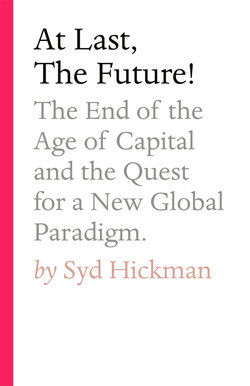At Last, The Future!

Реклама. ООО «ЛитРес», ИНН: 7719571260.
Оглавление
Syd Hickman. At Last, The Future!
Introduction
Part One: Challenges to the Capitalist Paradigm
Work
Population
The Environment
Ethical Choices
Longer Lives
Enhanced Humans
Foetal Development
Global War
Emerging Issues
Politics & Government
Complexity
Meaning
The Failures of Capitalism
Perfect Markets
The Globalisation of Capitalism
Intellectual Property Replaces Capital as Key to Success
Resource Limits & National Interventions
Rich Nation Response to Competition
Social Dislocation
The Dominance of Finance
Surplus Recycling
Conclusion
Part Two: Paradigms Through History
Influential Early Paradigms. Athens
Persia
The Jews
Rome
The Byzantine Empire
The Islamic Empires of the Arabs and the Turks
China
Japan
India
Russia
The United States of America
Part Three: Europe's Global Paradigms
Feudalism
Paradigm Change Driven by Printing and Publishing
From Feudalism to Early Capitalism
Pragmatic Early Capitalism
Mass Media and the Rise of Idealist Capitalism
Idealist Capitalism and its Idealist Enemies
Digital Networks
Part Four: The 'Kosmos' Paradigm
A New Approach to Economics
Expanding the Social Sector
Revitalising Government, Democracy, and Freedom
End/Beginning
Sources & References
INTRODUCTION
CHALLENGES TO THE PARADIGM. Work
Creating meaning
Population
Environment
Ethical Choices
Politics
Complexity
The Failures of Capitalism
Finance
PARADIGMS THROUGH HISTORY
INFLUENTIAL EARLY PARADIGMS. Persia
Athens
The Jews
Rome
The Byzantine Empire
The Islamic Empires of the Arabs and Turks
China
Japan
India
Russia
The United States of America
EUROPE’S GLOBAL PARADIGMS. Feudalism
Paradigm Change Driven by Printing and Publishing
From Feudalism to Early Capitalism
Pragmatic Early Capitalism
Mass Media and the Rise of Idealist Capitalism
Idealist Capitalism and its Idealist Enemies
Digital Networks and Neoliberalist Capitalism
THE KOSMOS PARADIGM. A New Approach to Economics
Government, Democracy and Freedom
Отрывок из книги
Our world is extremely complex. We necessarily understand it through generalisations, simplifications, and rules. This shared understanding is known as a ‘societal paradigm’. A paradigm - or big picture - is simply the shared understanding that enables a culture or civilization to function in a reasonably orderly way. While individuals will have their own ideas on the world and how it works, a paradigm provides a collective way to make sense of the myriad bits of information we process every day, and offers broad guidance on how to respond to events.
Paradigms are shaped by leaders and by prevailing realities. They are taught by parents and teachers, and disseminated across society in general. In any successful community the paradigm is widely shared and enthusiastically maintained. But during a period of rapid change the standard simplifications work less and less well, so confusion and disillusion start to spread. The paradigm becomes decreasingly useful as an explanation for events or as a guide to future action. At this point a new set of useful ideas and simplifications must be developed if a society is to function effectively. But the transition from one paradigm to the next, the paradigm shift, itself is usually - perhaps inevitably - extremely difficult. It can often be protracted and involve intense battles to decide which ideas and attitudes will prevail in the new era. The nations that become the happiest soonest are those that quickly recognise the new imperatives and opportunities, stop trying to prop up the past, and get on bravely with constructing the future.
.....
Kuhn’s description of change is relevant to the huge societal paradigm shift now under way. He explained that old paradigms break down when problems arise that the old methods can’t solve, and facts appear that do not fit with the established big picture. Then new ideas are proposed, placing these difficulties in a new picture that makes some sense of them. Younger people, and a few old hands, adopt the new way of thinking. They do this more because the new way offers better prospects for the future of their field than because it is logically superior. Kuhn describes this process as more like conversion than conviction by evidence. Adoption of the new path is based mostly on faith or hope.
With more work by many people the new ideas get stronger and attract more followers. Many older advocates of the previous paradigm never accept the new way but eventually they die out and the new ideas become the accepted paradigm
.....